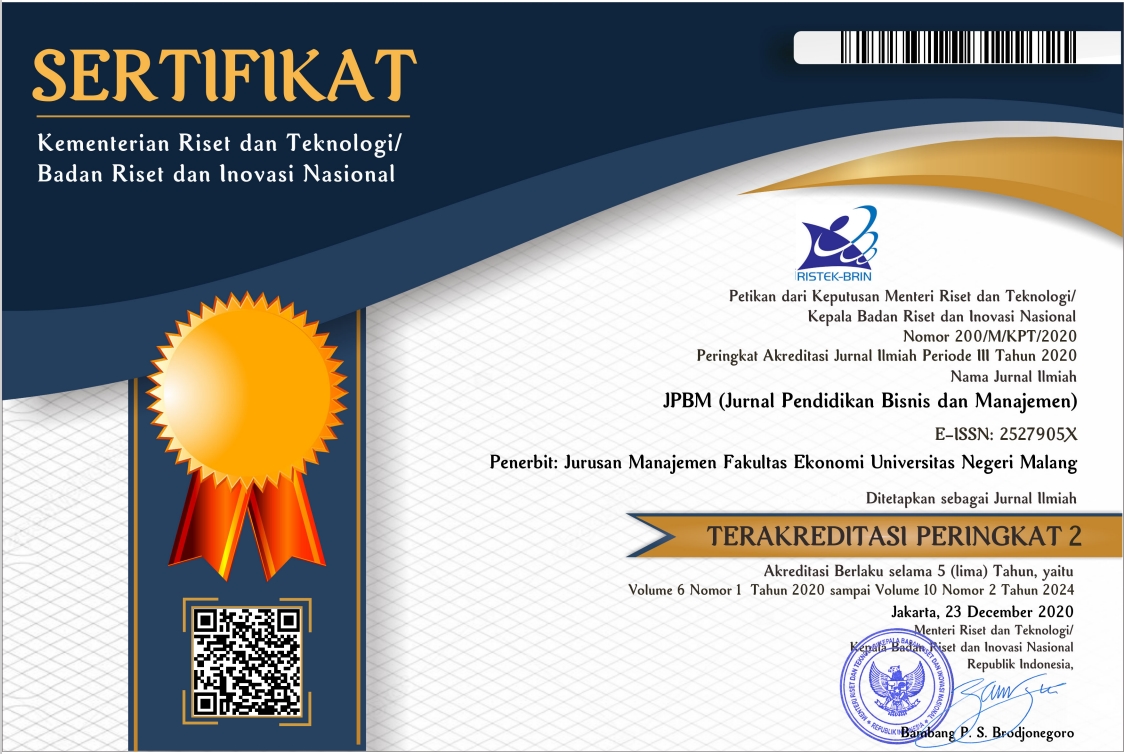Do Work Motivation Have Roles in Employee Performance? Insight from Kampung Marketer Social Entrepreneuship
Abstract
Keywords
Full Text:
PDFReferences
Abogsesa, A. S., & Kaushik, G. (2018). Impact of Training and Development on Employee Performance. International Journal of Civic Engagement and Social Change. https://doi.org/10.4018/ijcesc.2017070104
Albrecht, S. L., Bakker, A. B., Gruman, J. A., Macey, W. H., & Saks, A. M. (2015). Employee engagement, human resource management practices and competitive advantage: An integrated approach. In Journal of Organizational Effectiveness. https://doi.org/10.1108/JOEPP-08-2014-0042
Bedarkar, M., & Pandita, D. (2014). A Study on the Drivers of Employee Engagement Impacting Employee Performance. Procedia - Social and Behavioral Sciences. https://doi.org/10.1016/j.sbspro.2014.04.174
Bernardin, H. J., & Russel, J. E. . (1993). Human Resourses management. New York: Mc Graw Hill Inc.
Breaugh, J. A. (2013). Employee Recruitment. Annual Review of Psychology. https://doi.org/10.1146/annurev-psych-113011-143757
Brown, K. G., & Sitzmann, T. (2010). Training and employee development for improved performance. In APA handbook of industrial and organizational psychology, Vol 2: Selecting and developing members for the organization. https://doi.org/10.1037/12170-016
Bryant, P., & Allen, D. (2013). Compensation, Benefits and Employee Turnover: HR Strategies for Retaining Top Talent. Compensation & Benefits Review. https://doi.org/10.1177/0886368713494342
Burney, L. L., & Widener, S. K. (2013). Behavioral work outcomes of a strategic performance measurement system-based incentive plan. Behavioral Research in Accounting. https://doi.org/10.2308/bria-50501
Carpenter, H. L. (2017). Talent management. In The Nonprofit Human Resource Management Handbook: From Theory to Practice. https://doi.org/10.4324/9781315181585
Cherian, J., & Jacob, J. (2013). Impact of Self Efficacy on Motivation and Performance of Employees. International Journal of Business and Management. https://doi.org/10.5539/ijbm.v8n14p80
Cohen, E. (2014). Employee training and development. In CSR for HR: A Necessary Partnership for Advancing Responsible Business Practice. https://doi.org/10.9774/gleaf.978-1-907643-30-9_10
D’Annunzio-Green, N., & Ramdhony, A. (2019). It’s not what you do; it’s the way that you do it: An exploratory study of talent managementas an inherently motivational process in the hospitality sector. International Journal of Contemporary Hospitality Management. https://doi.org/10.1108/IJCHM-11-2018-0905
Dipboye, R. L., & Dipboye, R. L. (2018). 12. Employee Training and Development. In The Emerald Review of Industrial and Organizational Psychology. https://doi.org/10.1108/978-1-78743-785-220181016
Ghasemi, F., Mohammadfam, I., Soltanian, A. R., Mahmoudi, S., & Zarei, E. (2015). Surprising incentive: An instrument for promoting safety performance of construction employees. Safety and Health at Work. https://doi.org/10.1016/j.shaw.2015.02.006
Gruman, J. A., & Saks, A. M. (2011). Performance management and employee engagement. Human Resource Management Review. https://doi.org/10.1016/j.hrmr.2010.09.004
Guan, X., & Frenkel, S. (2019). How perceptions of training impact employee performance: Evidence from two Chinese manufacturing firms. Personnel Review. https://doi.org/10.1108/PR-05-2017-0141
Guerrero, M., Santamaría-Velasco, C. A., & Mahto, R. (2020). Intermediaries and social entrepreneurship identity: implications for business model innovation. International Journal of Entrepreneurial Behaviour and Research. https://doi.org/10.1108/IJEBR-10-2020-0679
Guo, L., Wong-On-Wing, B., & Lui, G. (2013). Input-based performance evaluation incentive intensity and proactive work behavior. Advances in Management Accounting. https://doi.org/10.1108/S1474-7871(2013)0000022013
Gupta, N., & Shaw, J. D. (2014). Employee compensation: The neglected area of HRM research. Human Resource Management Review. https://doi.org/10.1016/j.hrmr.2013.08.007
Hameed, A., Ramzan, M., Hafiz, M., Kashif Zubair, M., Ali, G., & Arslan, M. (2014). Impact of compensation on employee performance. International Journal of Business and Social Science.
Hudson, M., Smart, A., & Bourne, M. (2001). Theory and practice in SME performance measurement systems. International Journal of Operations and Production Management. https://doi.org/10.1108/EUM0000000005587
J., A. (2014). Determinants of employee engagement and their impact on employee performance. International Journal of Productivity and Performance Management. https://doi.org/10.1108/IJPPM-01-2013-0008
Jiang, K., Lepak, D. P., Hu, J., & Baer, J. C. (2012). How does human resource management influence organizational outcomes? A meta-analytic investigation of mediating mechanisms. Academy of Management Journal. https://doi.org/10.5465/amj.2011.0088
Kanat-Maymon, Y., Mor, Y., Gottlieb, E., & Shoshani, A. (2017). Supervisor motivating styles and legitimacy: moderation and mediation models. Journal of Managerial Psychology. https://doi.org/10.1108/JMP-01-2017-0043
Khalid, K., & Nawab, S. (2018). Employee Participation and Employee Retention in View of Compensation. SAGE Open. https://doi.org/10.1177/2158244018810067
Klein, H. J., & Park, H. (2015). Organizational Commitment. In International Encyclopedia of the Social & Behavioral Sciences: Second Edition. https://doi.org/10.1016/B978-0-08-097086-8.22032-1
Kumari, N., & Singh, D. (2018). Impact of organizational culture on employee performance. Prabandhan: Indian Journal of Management. https://doi.org/10.17010/pijom/2018/v11i6/128442
Luke, B., & Chu, V. (2013). Social enterprise versus social entrepreneurship: An examination of the “why” and “how” in pursuing social change. International Small Business Journal, 31(7), 764–784. https://doi.org/10.1177/0266242612462598
Lunenburg, F. C. (2011). Goal-Setting Theory of Motivation. International Journal of Management, Business, and Administration.
Ma’ruf, F., Hadari, I. R., & Amalia, D. (2019). EMPLOYEE MOTIVATION AND PERFORMANCE MODELS. International Review of Management and Marketing. https://doi.org/10.32479/irmm.8811
Maalaoui, A., Le Loarne-Lemaire, S., & Razgallah, M. (2020). Does knowledge management explain the poor growth of social enterprises? Key insights from a systematic literature review on knowledge management and social entrepreneurship. Journal of Knowledge Management, 24(7), 1513–1532. https://doi.org/10.1108/JKM-11-2019-0603
Mahmud, A., & Susilowati, N. (2019). Human Values Model Analysis on Organizational Commitment in Higher Eduation. Jurnal Dinamika Manajemen, 10(1), 46–57. https://doi.org/10.15294/jdm.v10i1.17569
Mandey, S., & Sahangggamu, P. (2014). PENGARUH PELATIHAN KERJA, MOTIVASI, DAN DISIPLIN KERJA TERHADAP KINERJA KARYAWAN PADA PT. BANK PERKREDITAN RAKYAT DANA RAYA. Jurnal Riset Ekonomi, Manajemen, Bisnis Dan Akuntansi. https://doi.org/10.35794/emba.v2i4.6359
Naderi, A., Nasrolahi Vosta, L., Ebrahimi, A., & Jalilvand, M. R. (2019). The contributions of social entrepreneurship and transformational leadership to performance: Insights from rural tourism in Iran. International Journal of Sociology and Social Policy, 39(9–10), 719–737. https://doi.org/10.1108/IJSSP-06-2019-0124
Nitsche, M. (2014). Performance. In The Routledge Companion to Video Game Studies. https://doi.org/10.4324/9780203114261
O’Connor, S. J., Borkowski, N., & Kemp, R. (2015). Employee motivation. In Handbook of Healthcare Management. https://doi.org/10.4337/9781783470167.00015
Peterson, S. J., & Luthans, F. (2006). The impact of financial and nonfinancial incentives on business-unit outcomes over time. In Journal of Applied Psychology. https://doi.org/10.1037/0021-9010.91.1.156
Pizarro, N. (2016). An Integrated Model of Employee Adoption. New England Journal of Entrepreneurship, 19(1), 54–69. https://doi.org/10.1108/neje-19-01-2016-b004
Platis, C., Reklitis, P., & Zimeras, S. (2015). Relation between Job Satisfaction and Job Performance in Healthcare Services. Procedia - Social and Behavioral Sciences. https://doi.org/10.1016/j.sbspro.2015.01.1226
Price, J. L. (1997). Handbook of organizational measurement. In International Journal of Manpower. https://doi.org/10.1108/01437729710182260
Ramlall, S. (2004). A Review of Employee Motivation Theories and their Implications for Employee Retention within Organizations. Journal of American Academy of Business.
Rita, M., Randa Payangan, O., Rante, Y., Tuhumena, R., & Erari, A. (2018). Moderating effect of organizational citizenship behavior on the effect of organizational commitment, transformational leadership and work motivation on employee performance. International Journal of Law and Management. https://doi.org/10.1108/IJLMA-03-2017-0026
Rohim, A., & Budhiasa, I. G. S. (2019). Organizational culture as moderator in the relationship between organizational reward on knowledge sharing and employee performance. Journal of Management Development. https://doi.org/10.1108/JMD-07-2018-0190
Sattar, S., & Ahmed, S. (2014). Factors effecting employee turnover in banking sector. Developing Country Studies.
Shahzadi, I., Javed, A., Pirzada, S. S., Nasreen, S., & Khanam, F. (2014). Impact of Employee Motivation on Employee Performance. European Journal of Business and ManagementOnline).
Sharma, S., & Taneja, M. (2018). The effect of training on employee performance. International Journal of Recent Technology and Engineering.
Siemsen, E., Balasubramanian, S., & Roth, A. V. (2007). Incentives that induce task-related effort, helping, and knowledge sharing in workgroups. Management Science. https://doi.org/10.1287/mnsc.1070.0714
Sonnentag, S., & Frese, M. (2005). Performance Concepts and Performance Theory. In Psychological Management of Individual Performance. https://doi.org/10.1002/0470013419.ch1
Truitt, D. L. (2011). Effect of training and development on employee attitude as it relates to training and work proficiency. SAGE Open. https://doi.org/10.1177/2158244011433338
Turner, K., Crook, T. R., Miller, A., Turner, K., Crook, T. R., & Miller, A. (2014). Social Entrepreneurship and Research Methods. i. https://doi.org/10.1108/s1479-8387_2014_0000009002
Zhang, X., Lin, Z., Liu, Y., Chen, X., & Liu, D. M. (2020). How do human resource management practices affect employee well-being? A mediated moderation model. Employee Relations. https://doi.org/10.1108/ER-08-2019-0320
Refbacks
- There are currently no refbacks.
JPBM (Jurnal Pendidikan dan Bisnis Manajemen) is licensed under a Creative Commons Attribution-NonCommercial-ShareAlike 4.0 International License.
JPBM (Jurnal Pendidikan dan Bisnis Manajemen) is abstracted and indexed in :
















